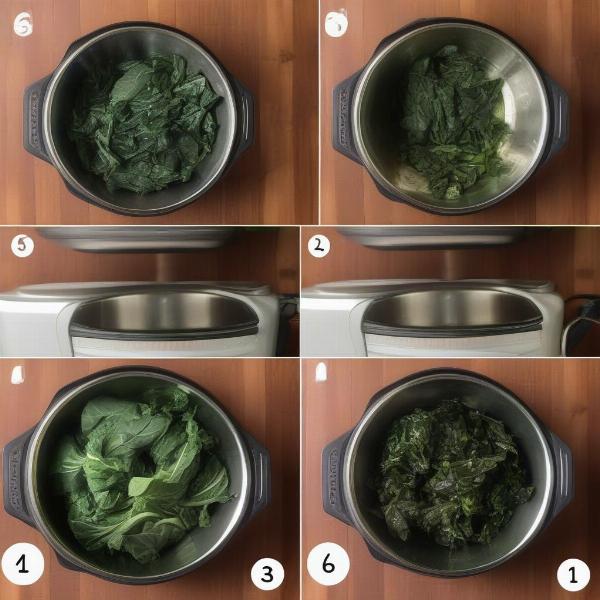Collard greens are a popular, nutrient-rich vegetable for humans, but can dogs eat collard greens safely? This article will explore the potential benefits and risks of feeding collard greens to your canine companion, providing you with the information you need to make informed decisions about their diet. We’ll cover everything from nutritional value to preparation methods and potential side effects, ensuring you can keep your furry friend happy and healthy.
Understanding the Nutritional Value of Collard Greens for Dogs
Collard greens are packed with vitamins A, K, and C, as well as fiber and antioxidants. These nutrients can contribute to a dog’s overall health, supporting immune function, vision, and healthy digestion. Vitamin K is particularly important for blood clotting, while antioxidants help protect against cellular damage. However, it’s important to remember that dogs obtain most of the nutrients they need from a balanced, complete dog food.
While collard greens can be a healthy addition to a dog’s diet, they should be fed in moderation. Too much fiber can lead to digestive upset, including gas, bloating, and diarrhea.
Preparing Collard Greens for Your Dog
If you decide to introduce collard greens to your dog’s diet, it’s crucial to prepare them correctly. Raw collard greens can be difficult for dogs to digest and may contain harmful bacteria. Always thoroughly wash the leaves and remove any tough stems.
 Preparing Collard Greens for Dogs
Preparing Collard Greens for Dogs
Steaming or boiling collard greens until they are soft is the best way to make them easier for your dog to digest. Avoid adding any seasonings, especially salt, onion, or garlic, as these can be toxic to dogs.
Potential Risks and Side Effects of Collard Greens for Dogs
While collard greens offer some nutritional benefits, there are also potential risks to consider. Collard greens contain calcium oxalate, which can contribute to the formation of bladder stones in susceptible dogs. If your dog has a history of urinary tract issues, consult your veterinarian before adding collard greens to their diet.
are collard greens good for dogs
Additionally, large amounts of collard greens can interfere with the absorption of iodine, which can lead to thyroid problems. Moderation is key when feeding collard greens, and it’s always best to introduce new foods gradually to monitor for any adverse reactions.
Can Puppies Eat Collard Greens?
While adult dogs can usually tolerate small amounts of collard greens, it’s best to avoid feeding them to puppies. Their digestive systems are still developing, and introducing new foods can easily cause upset. Stick to a high-quality puppy food to ensure they get all the nutrients they need for healthy growth.
Monitoring Your Dog’s Reaction to Collard Greens
Always introduce collard greens slowly and in small amounts. Observe your dog for any signs of digestive upset, such as vomiting, diarrhea, or excessive gas. If you notice any adverse reactions, discontinue feeding collard greens and consult your veterinarian.
Conclusion: Collard Greens for Dogs – A Treat in Moderation
Collard greens can offer some nutritional benefits to dogs when fed in moderation and prepared correctly. However, it’s crucial to be aware of the potential risks, especially for dogs with pre-existing health conditions. Always consult your veterinarian before adding any new foods to your dog’s diet, and monitor their reaction closely. A balanced, complete dog food should always be the foundation of your dog’s nutrition.
FAQ:
- Can dogs eat raw collard greens? While not toxic, raw collard greens can be difficult for dogs to digest and may harbor harmful bacteria. It’s best to cook them before offering them to your dog.
- How much collard greens can I give my dog? Start with a very small amount and observe your dog’s reaction. A few small, cooked pieces are usually sufficient.
- Are collard greens good for all dogs? Dogs with urinary tract or thyroid issues should avoid collard greens. Consult your vet if you have concerns.
- What are the signs of collard green intolerance in dogs? Vomiting, diarrhea, excessive gas, and loss of appetite can be signs of intolerance.
- Can I mix collard greens with my dog’s regular food? Yes, you can mix a small amount of cooked, chopped collard greens with your dog’s regular food.
- What are some other healthy vegetables for dogs? Carrots, green beans, and sweet potatoes are some other healthy vegetable options for dogs.
- Are there any vegetables I should absolutely avoid giving my dog? Onions, garlic, grapes, raisins, and avocados are toxic to dogs and should be avoided.
ILM Dog is a leading international pet website dedicated to providing dog owners with reliable and practical advice on all aspects of dog care and wellbeing. From breed selection and puppy care to senior dog health and training, we offer expert guidance to help you navigate every stage of your dog’s life. We cover a wide range of topics including nutrition, health, training, grooming, and product reviews. For more expert advice and resources on dog care, visit ILM Dog or contact us at [email protected] or +44 20-3965-8624.